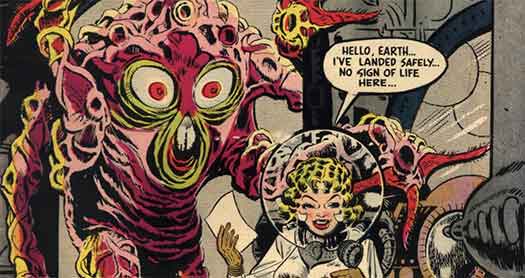After whetting his appetite at this year’s Comic-Con, our resident Linux newbie discovers free and open source apps for reading digital comics, as well as a treasure trove of available sources for free comics online.
The Linux Gadabout
San Diego Comic-Con 2016 has come to a close and baby, I got the blues. On one hand, I really don’t like crowds. On the other hand, there’s something inspiring about experiencing more than 130,000 geeks — many of them dressed like superheroes, supervillains, and other denizens from the realm of science fiction and fantasy — annually invading downtown San Diego for the better part of a week. So even during the years I don’t attend the convention itself, I usually make it to the general vicinity of the convention center to behold the chaotic spectacle of it all.

It’s a good chance to catch up with old friends visiting from out of town, but also an opportunity to strike up conversations with random Imperial stormtroopers, Ghostbusters, Star Fleet officers, Deadpools, Time Lords, Harley Quinns, Hobbits, Klingons, Supermen, Superwomen, zombies, killer robots, and Henry Kissingers. (All right. Maybe not that last one, but it gives me an idea for next year.) It’s an effective reminder that we’re all a little obsessed with something — whether it’s FOSS, fixing cars, or donning a skin-tight getup to hike through a sweaty maelstrom of the aforementioned in the middle of a San Diego summer as a way to show the world how much you love the Adam West incarnation of Batman.
Some have lamented the ongoing commercialization of an event that began in the ’70s chiefly to celebrate the reason for its namesake: comic books. But like any holiday (and in San Diego, Comic-Con is definitely a holiday), the original meaning for its existence has been distorted over time. The most well-attended panels at the convention these days typically feature the casts of popular movies and television series, but if you’re there for the comic book related panels, you probably won’t have to wait in much of a line for a good seat. I prefer to see it as an event that offers something to everyone rather than getting weepy-eyed about what some perceive as its loss of “purity” over the years.
And while the glitz and glamour of Game of Thrones, Star Wars, and countless superhero movies and TV shows may be the skin that everyone sees when they gaze upon modern Comic-Con media coverage, comics are still its heart. So when I had a chance to attend the convention last Friday thanks to a generous friend with an extra pass, I made sure to get a good look at what comic book artists and writers are offering these days. The experience renewed my love for this peculiar kind of literature — which perseveres thanks to the passion of its storytellers no matter how thankless the industry can be at times.
Now that I’m home and trying to come to terms with all the comic books I’ve been missing out on over decades of neglect, I can only try to begin the process of catching up. Here’s how I plan on using FOSS and freely available online resources to help me do it.
Digital Comic Books

[Photo credit: Science Fiction Space Adventures #12]
Sure, I love holding a physical comic book in my hands. The rustling pages and scent of freshly painted pulp really take me back to a time when I could spend my allowance and lawnmowing money on fun stuff like comic books instead of adult realities like food and shelter. That said, I don’t have the room in my adult shelter to collect comic books anymore, which is where 21st century technology and open source solutions come in handy. Also, I owe my mom a big apology for not realizing how much space in her adult shelter I was taking up with my childhood comic book collection.
There are a few free viewers for Linux available online designed specifically to grant digital access to comic book content. For my purposes, I decided to check out the Comix-derived project MComix, which handles western comics as well as manga in various formats, including CBR, CBZ, CB7, CBT, LHA, and PDF. Okular and Evince might even do the trick, depending on the source. In many cases, you can even read comics in your browser if you don’t feel like fiddling with downloading anything (though the experience likely won’t be as pretty).
I think this goes without saying for most FOSS Force readers, but still deserves mention: while the software for viewing it may be free, please don’t illegally download comic book content that’s still for sale by its original creators. It’s already a tough livelihood that deserves our support if we want to keep enjoying it. Luckily, there are a lot of comics legally available for free if you know where to look for them. Here are a few suggestions:
- Comic Book Plus: A site for reading and downloading public domain Golden and Silver Age comic books, comic strips, and pulp fiction. All content is free and legal. Are there non-English comics here? Oui!
-
The Digital Comic Museum: All files here have been researched by the staff and users to make sure they are copyright free and in the public domain. Open Culture estimates this library includes over 15,000 pre-1959 comics.
-
172 Places for Free Comic Books and Graphic Novels Online: A huge list from Gizmo’s Freeware that, while it hasn’t been updated since 2015, seems pretty intact.
-
Internet Archive Comic Books and Graphic Novels Collection: Digitized comic books and graphic novels, just like the sign says! There’s even some manga here, if that’s your bag — but not all of it is safe for work (depending on your job).
-
ComiXology: Admittedly the least open source of the bunch, this is an Amazon-owned site that offers introductory comic books and teasers designed to entice you into purchasing other books in the series with the infamously addicting “first one’s free” model. Not that there’s anything wrong with that, but it’s worth a warning.
Comic Book Archives
But what about the physical comic book collection I already have? What if I’m a successful grown-up with disposable income and my reading den is as spacious as Bill Gates’ sweater closet? Then you might want to consider the importance of keeping track of that carefully curated comic book collection with the assistance of a FOSS solution. My choice so far is Tellico, which also helps organize other collections one might have cluttering up the old mansion: “books, videos, music, even your wine, and anything else,” according to the official site. It allows you to reference information from online sources like IMDB, Amazon, The Open Library, Discogs, Freebase, and more, which is nice when you don’t want to manually enter every last detail by hand.
Other popular options I’ve seen suggested include GNOME Comics Organizer and GCstar.
Know about any other Linux friendly comic book viewers, free (and legal) comic book resources, or comic book collection archives that might have escaped me on this first pass? Please let us know! Also, if anybody’s got access to fangs I might employ for my Henry Kissinger costume at next year’s Comic-Con, I’d be most grateful.
“Bob” Fogarty was the editor-in-chief at Chris Pirillo’s LockerGnome.com for nearly 12 years, and has written for ReadWrite.com and TheArtofCharm.com. He lives in San Diego with his wife and a medium-sized menagerie of beasties great and small. Follow him on Twitter: @Fogarty









Great information. I’ve been looking for a solution to comic book cataloguing that doesn’t involve keeping a Windows machine around to run Comic Collector Pro, but I haven’t found one that met my requirements yet. Tellico seemed promising the last time I looked at it; how’s its database source, and can it search by barcode?
It bears adding, for digital comics collecting, that some books on Comixology are DRM-free and some aren’t. All of Image’s books are DRM-free; none of DC’s or Marvel’s are. Look for the download arrow on a comic’s listing; that indicates that a comic can be downloaded and opened in a reader of your choosing (ie as a standard CBZ file).
Thanks, Thad! I’m still poking around in Tellico to see what it’ll allow me to catalog. There’s a lot of room for customization, but it’s not completely intuitive at first glance. It does, however, have a field for searching by ISBNs from a number of sources.
Thanks for the heads up on Comixology. I guess I would expect DC and Marvel releases to be shackled to DRM, but it’s good to know not everything offered there is.
For DRM free comics I have been using YACReader for years. http://www.yacreader.com
It has a client for iOS too.
Unless I am mistaken, files like CBR cannot be open under ‘free’ GNU/Linux distributions such as Trisquel as the compression format is not free. Under mainstream GNU/Linux distributions like Ubuntu, these files open just fine. But these distros have proprietary blobs. I am not even sure if Comix will install in Trisquel.
I highly doubt there is anything in Trisquel which would actually prevent you from installing unrar if you wanted to (although of course it is not provided in their repositories). However, it’s true that rar is a proprietary protocol and requires proprietary software to extract or compress. This is not actually system software, but just a program that you run (or that can serve as a backend for another program).
@ikhider: Right, for folks interested in free-as-in-speech formats, CBR doesn’t fit the bill, so you’ll want to double-check that you’re getting CBZ, not CBR, before you buy anything.
I tried installing proprietary programs on Trisquel and there often seems to be library issues, conflicts, crashes and so on. They really don’t want you installing proprietary stuff. Which is okay. That said, I do enjoy comics/manga/and so on.
Adding, re: DRM: there was a story a few years ago where Comixology chose not to release an issue of an Image comic, Saga, onto the iOS version of their store (IIRC), due to content. There was a media storm around it for a day or two, and Comixology reversed course and published the issue after all. But it wasn’t long after that the Image announced all its books would go DRM-free, and I strongly suspect the two things were related; Image received an object lesson in the downside of locking yourself into a monopoly provider by accepting DRM.
I think the Humble Bundle and other similar bundles have had a strong impact on other publishers going DRM-free; IDW went mostly DRM-free after a couple of successful bundles, and even (surprisingly, to me at least) convinced some of its licensors, like Hasbro, to agree to the DRM-free policy. (Other licensors, like Nickelodeon, have not agreed, at least last I checked, so IDW still publishes some books with DRM.) Other publishers like Boom and Valiant have followed suit. Others, like Fantagraphics, seem to be pretty split between DRM-free and DRM-encumbered distribution, even on creator-owned books.
It’s been interesting to watch. But yeah, I definitely look for the arrow icon before I buy anything through Comixology.
I cant believe I didn’t think about it before but you might want to try Peruse (that is, if you’re still reading these comments):
https://peruse.kde.org/
Cheers!